AAC Goes to Summer Camp

Those of you who are still digging your way out of the most recent snowstorm may not believe it, but it’s almost time to make plans for summer. There are quite a few AAC camps, some that are quite well established and others that have been running for only a few years (see our AAC Camp Pinterest board here). In this post, we hear about one of them from Tina Moreno, an SLP and mom of Mateo, who uses PicturePower 100 on the Maestro to communicate, maintain friendships with his teammates on the cross country team, advocate for himself, reveal his wicked sense of humor, and even sing the National Anthem for his high school’s basketball games. Tina blogs at Voices4All. With the help of Drs. Karen Erickson and David Koppenhaver, she and her friend Gina Cunningham created Camp ALEC together in memory of Gina’s son Alec, who never gave up, and whose love of learning was never extinguished. Camp ALEC is a labor of love for these two friends and partners whose motto is LANGUAGE + LITERACY = EMPOWERMENT. They are getting ready for Camp ALEC 2015 (August 9-15 at Indian Trails Camp in Grand Rapids, Michigan), but in the meantime, let’s find out what lessons were learned from last summer’s experience.
What I Learned at Camp ALEC
You know a summer camp is amazing (and effective!) when the kids aren’t sure when the recreational activities end and the literacy lessons begin because they are having a blast all day long. Or if the campers wonder whether the adults spearheading those fun events throughout the day are camp counselors or [gasp!] teachers there to assess and build their skills in reading and writing. When learning is fun, it’s impossible to tell it’s work. Camp ALEC is such a camp. Offered for the first time in Philadelphia last summer, Camp ALEC has found a new home at beautiful Indian Trails Camp in Grand Rapids, MI, a barrier-free camp for children with disabilities, boasting 1:1 care to address personal care and medical needs as needed.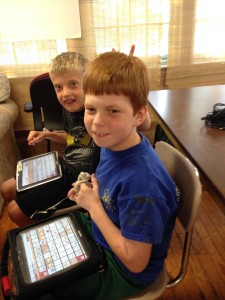
This summer, the program will bring together 20 children with physical disabilities who use AAC to communicate and 20 educators who have already received level 1 training through literacy experts Drs. Karen Erickson and David Koppenhaver. Together, we will create a magical week of building skills in communication, reading, writing, self-advocacy, forming friendships, and independence and a whole lot of fun.
Last summer in Philadelphia, we hosted 14 campers who traveled from as far away as Colorado, Georgia and Michigan to take part in this unique week. These children and young adults communicated with an array of AAC devices using access modes that included direct selection, switches, scanning and eye gaze. We were joined by 14 teachers and speech-language pathologists from the U.S. and Canada. The educators and campers spent three hours together each day engaged in 1:1 and small group interventions and assessment to determine strategies that would strengthen their areas of weakness in reading and writing. During the rest of the time, campers took part in typical summer camp experiences such as swimming, dances, murder mysteries, crazy science experiments, field games and more while the educators received classroom-based training with Karen and David. At the end of the week, campers left with memories, lifelong friends and a report that included the results of an informal literacy assessment based on the Whole-to-Part model and recommendations for research-based interventions that could be implemented by educational teams throughout the school year.
With Karen and David at the helm, my role at camp was to help troubleshoot AAC glitches, intermediate between campers and their counselors, comfort homesick children, help implement pranks to make everyone laugh (often at my own expense) and, generally, jump in to do anything needed. I shared this role with Gina Cunningham, whose expertise in assistive technology, was invaluable throughout the week. All the while, between my running, I had the opportunity to observe excellent instruction. I watched as the children became more and more confident with each day. Campers shared with me their own works with pride and enthusiasm. They pulled me aside to brainstorm on projects, shared news about their developing crushes and sought advice when problems arose. What a privilege it was!
It wasn’t just the campers who were having a blast. The educators, though a little exhausted and bleary eyed by the end of the week, hugged us with gratitude for the opportunity to work with these amazing learners. These committed teachers and SLPs traveled a long distance for this intensive hands-on training with Karen and David. From the start, they presumed competence and set the bar high for the campers. Educators left camp with evidenced-based strategies to implement at school and, perhaps, with bars raised even higher for the students in their own classrooms.
Here are just a few of the lessons I learned at Camp ALEC:
Presume Competence
This wasn’t a new lesson, of course, but it is worth mentioning over and over again. Without a doubt, Camp ALEC educators arrived already presuming competence, but I think many were still a little surprised by the abilities of our campers. With encouragement, these children and young adults were able to share with us insight into their own strengths and weaknesses and left camp with strategies they could implement on their own. It’s our hope that EVERYONE—adults and campers—left Camp ALEC feeling more empowered.
Fun matters
Truth be told, we had one or two very homesick campers. When Karen and David observed one young lady crying and begging to go home, they proposed a scheme to distract her with a teen night that included planning a prank on the literacy counselors. Of course, this evening included all the components of excellent communication, reading and writing. Together, the campers brainstormed on the perfect storm of pranks, creating a WANTED poster for their beloved literacy counselors, including details regarding their crimes and the reward offered for their capture (dead or alive, by the way). The laughter that night brought every camper and adult to tears. And I doubt those children slept a wink because they couldn’t wait to see how their literacy counselors responded to the surprise the next day. By then, the homesickness had vanished and this camper was resolved to tackle the rest of the week with absolute gusto! This activity, while proposed and guided by clever and compassionate adults, was driven by the campers. Motivation is invaluable in education. Hard work doesn’t always have to feel like hard work.
Throw the lesson plan out the window
Lesson plans often get sabotaged and sometimes that’s when the best learning happens. In one lesson, a group of teenage girls brainstormed on the qualities of a good boyfriend. The list was long and there was excellent discussion. The next morning, much to everyone’s surprise, things got even more interesting when the activity had been sabotaged with a huge poster that included an orangutan in a tropical shirt bearing a remarkable resemblance to our own David with the claims to be an awesome beau. A lengthy investigation ensued, inquiries were made, suspects were interrogated and, eventually, the “criminals” were found out. A wrench was thrown into an already fantastic lesson and, as a result, campers spent two days engaged in conversation with everyone on campus, including fellow campers, counselors and kitchen staff. Yes, the literacy counselors provided guidance throughout, but it appeared to the campers that they were driving matters, their passion showed and so much more was gained.
Foster independence
Many of our campers had never been away from their parents overnight – even for a night or two. At the outset of camp, we presumed our youngest campers would experience the greatest homesickness, but our worries were misplaced. It was some of the oldest campers who 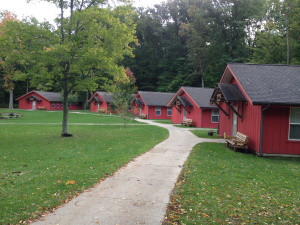 struggled most. They had never been expected to direct their own care before. Here, they had to make choices, even selecting their preferred shower chair, to ensure their comfort and safety. For some, it was very challenging. For our youngest campers, though, it was all taken in stride. This observation signaled to me that we need to help young children develop this independence as early as possible. When children rely on adults to meet their personal care and medical needs, they should participate actively in every process and learn to communicate their needs. There are many camps out there for children with disabilities, but very few promote this level of independence and help AAC communicators learn to advocate for themselves in an environment where the caregivers are unfamiliar to them.
struggled most. They had never been expected to direct their own care before. Here, they had to make choices, even selecting their preferred shower chair, to ensure their comfort and safety. For some, it was very challenging. For our youngest campers, though, it was all taken in stride. This observation signaled to me that we need to help young children develop this independence as early as possible. When children rely on adults to meet their personal care and medical needs, they should participate actively in every process and learn to communicate their needs. There are many camps out there for children with disabilities, but very few promote this level of independence and help AAC communicators learn to advocate for themselves in an environment where the caregivers are unfamiliar to them.
Writing with AAC
It is critical to make a distinction between verbal communication and writing. When it comes to teaching children who communicate using AAC to write, this distinction often becomes fuzzy. In my opinion, this may be due (at least in part) to the use of symbols in communication, the use of word prediction to provide access to words not available in the core vocabulary and the challenge of identifying a functional writing system for children with complex needs. I think that we often spend so much time identifying the right voice for a child that we sometimes overlook the need to find the right pencil and paper too. All children have the right to communicate and read and write. You can download samples of our reproducible manual spelling boards for beginner or advanced writers. They can be used during writing activities while the AAC communicator still has access to his own core vocabulary. [Click on the images at the end of this post, or visit the Downloads section of the eToolbox to get these communication aids.]
Getting published!
There is nothing more rewarding than getting your own works published! Tar Heel Reader offers a collection of free, easy-to-read, and accessible books on a wide range of topics. Each book can be speech enabled and accessed using multiple interfaces, including touch screens, the IntelliKeys with custom overlays, and 1 to 3 switches. Equally exciting, this site also provides a venue for publishing books. Authors add their own text to images selected from a huge collection of searchable pictures from Flickr or by downloading their own pictures. Books can be edited, then saved to the site for the enjoyment of others!
Filed under: PrAACtical Thinking
Tagged With: camp, Camp ALEC, flip book, letter board, literacy, Tina Moreno
This post was written by Carole Zangari
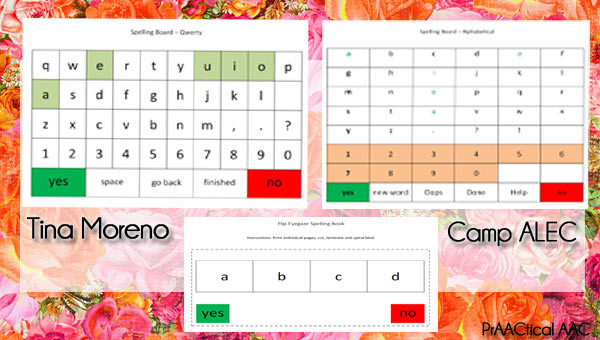

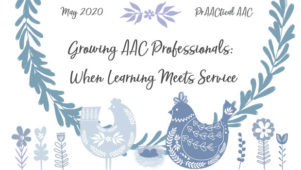
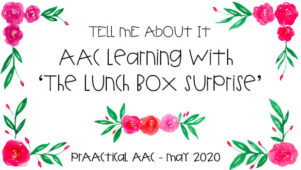
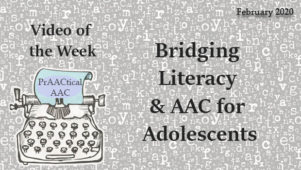
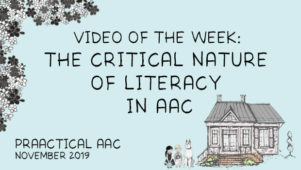
4 Comments
I had the privilege of participating in this incredible week long camp last summer and am forever changed. The combination of two of the most passionate and visionary sponsors (Gina and Tina) that I have ever met, two cutting edge researchers who not only bring powerful content and implementation with proven results,but truly believe in every one of these campers, then add amazing campers who will rock your world with their dreams, desire to learn and communicate and their tenacity to keep moving forward. Everything AAC and Literacy will be impacted because of this dream that is now becoming reality for the second year in a row. Thank you Carole for highlighting this endeavor.
Marlene, this really sounds like a wonderful experience and I am so glad to know that you found it so very inspiring. It is so gratifying to see quality programs like this gaining traction. Now, I just need to figure out a way to get there!
Any advice for a 16 yo with autism to move forward with her AAC. At school they switched her from prologue to Touch Chat. She currently mostly uses it to request, but they are already thugs she uses vocal approximations for. We do ” commenting” by looking in a magazine and taking turns, but that’s about it. Hard to see how she would start using the core language page.
I know this is a very late reply, but…
Many people on the autism spectrum have some area of intense interest. In my experience, even many autistic kids who rarely initiate interaction except to request can be drawn into a shared activity involving their area of interest. When both you and they are focused on their interest, they’ll often end up commenting a lot more.